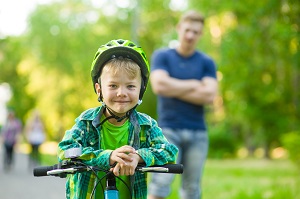Independence Day

Are we molly-coddling and restricting our children too much? Tim Lott explores why letting go is so hard.
When asked what a parent wants for their children, a good number will answer something like this: ‘I hope for them to grow up to be good, independent, loving, responsible people.’
These are all worthy goals, but the trouble is they are mixed up in people’s heads – including my own. Can a child be good if you don’t give them the opportunity to be bad? Can they be free to love if you demand that they love you? Can they be responsible if you are always instructing them what to do or protecting them from the consequences of their choices?
Can a child be responsible if you are always instructing them what to do?
This is where the independence part comes in. ‘I do want my children to be independent – but not just yet’ appears to be the secret thought at the back of our minds. So we continue to walk them to school way beyond an age when it is necessary, we scrutinize any potential romantic relationships for tell-tale signs of sexual activity, we help them with their homework to an unhelpful degree.
Is this simply because we want to be good and loving parents? Because there is no escaping the fact that the relationship between parent and child is a variety of transaction, and the costs and benefits are often hidden. In other words, we may say we want to give our children independence, and we may even genuinely want to. So why is it so difficult?
 The obvious answer is fear. We are terrified that our children will be abducted by a predatory paedophile, though the chances of that happening are about as high as being struck by lightening. We are worried if they ride a bike unsupervised on the road they will be knocked off and killed. We worry if we allow them to use a sharp knife when cooking, they will sever an artery.
The obvious answer is fear. We are terrified that our children will be abducted by a predatory paedophile, though the chances of that happening are about as high as being struck by lightening. We are worried if they ride a bike unsupervised on the road they will be knocked off and killed. We worry if we allow them to use a sharp knife when cooking, they will sever an artery.
This is smother love – a well-known phenomenon. I sometimes suffer from it myself. I muster my children on the roads on their bikes like a mother (or father) goose when they are cycling, and if they are back from wherever they are meant to be more than 15 minutes later than I expect, I get into a bit of a panic.
I don’t think this cossetting and fussing is particularly good for them, but it is at least well intentioned. We all want to protect our children. But I’m not sure that the instinct to save our children from harm by hobbling their independence is always so pure.
For the more we give them independence, the more they grow away from us. There is something addictive about the need our children have for us. It makes us feel important. To let them grow up is to let them grow away. So it is all too tempting to resist the urge for independence in children in order to bolster our own insecurities.
I’m not someone to say ‘OK, 14-year-old daughter, you can go to that pop festival on your own for the weekend because you need to learn to be independent.’ I am cautious, and I worry. And there is a fine line between irresponsibility and letting your children have their head.
There is something addictive about the need our children have for us.
However, on the whole we err on the side of caution. Our desire to protect our children from themselves is laudable, if perhaps misguided – but the desire to preserve our security as adults through the medium of our children is less so. We should pluck up courage, take a deep breath and get our hands off them as much as we safely can. Then they can at last become what we partly most fear – truly independent human beings












Leave a comment